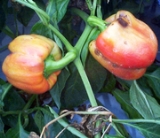
Plant virus
Overview
Plant viruses are virus
es that affect plants. Like all other viruses, plant viruses are obligate intracellular parasites that do not have the molecular machinery to replicate
without a host
. Plant viruses are pathogen
ic to higher plants. While this article does not intend to list all plant viruses, it discusses some important viruses as well as their uses in plant molecular biology
.
Although plant viruses are not nearly as well understood as the animal counterparts, one plant virus has become iconic.
Virus
A virus is a small infectious agent that can replicate only inside the living cells of organisms. Viruses infect all types of organisms, from animals and plants to bacteria and archaea...
es that affect plants. Like all other viruses, plant viruses are obligate intracellular parasites that do not have the molecular machinery to replicate
Self-replication
Self-replication is any behavior of a dynamical system that yields construction of an identical copy of that dynamical system. Biological cells, given suitable environments, reproduce by cell division. During cell division, DNA is replicated and can be transmitted to offspring during reproduction...
without a host
Host (biology)
In biology, a host is an organism that harbors a parasite, or a mutual or commensal symbiont, typically providing nourishment and shelter. In botany, a host plant is one that supplies food resources and substrate for certain insects or other fauna...
. Plant viruses are pathogen
Pathogen
A pathogen gignomai "I give birth to") or infectious agent — colloquially, a germ — is a microbe or microorganism such as a virus, bacterium, prion, or fungus that causes disease in its animal or plant host...
ic to higher plants. While this article does not intend to list all plant viruses, it discusses some important viruses as well as their uses in plant molecular biology
Molecular biology
Molecular biology is the branch of biology that deals with the molecular basis of biological activity. This field overlaps with other areas of biology and chemistry, particularly genetics and biochemistry...
.
Although plant viruses are not nearly as well understood as the animal counterparts, one plant virus has become iconic.

